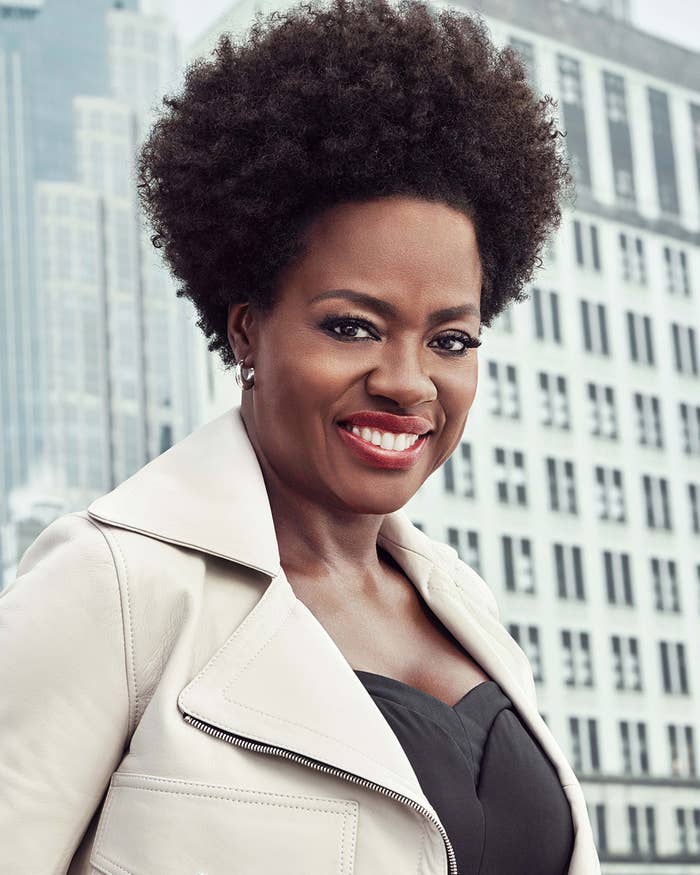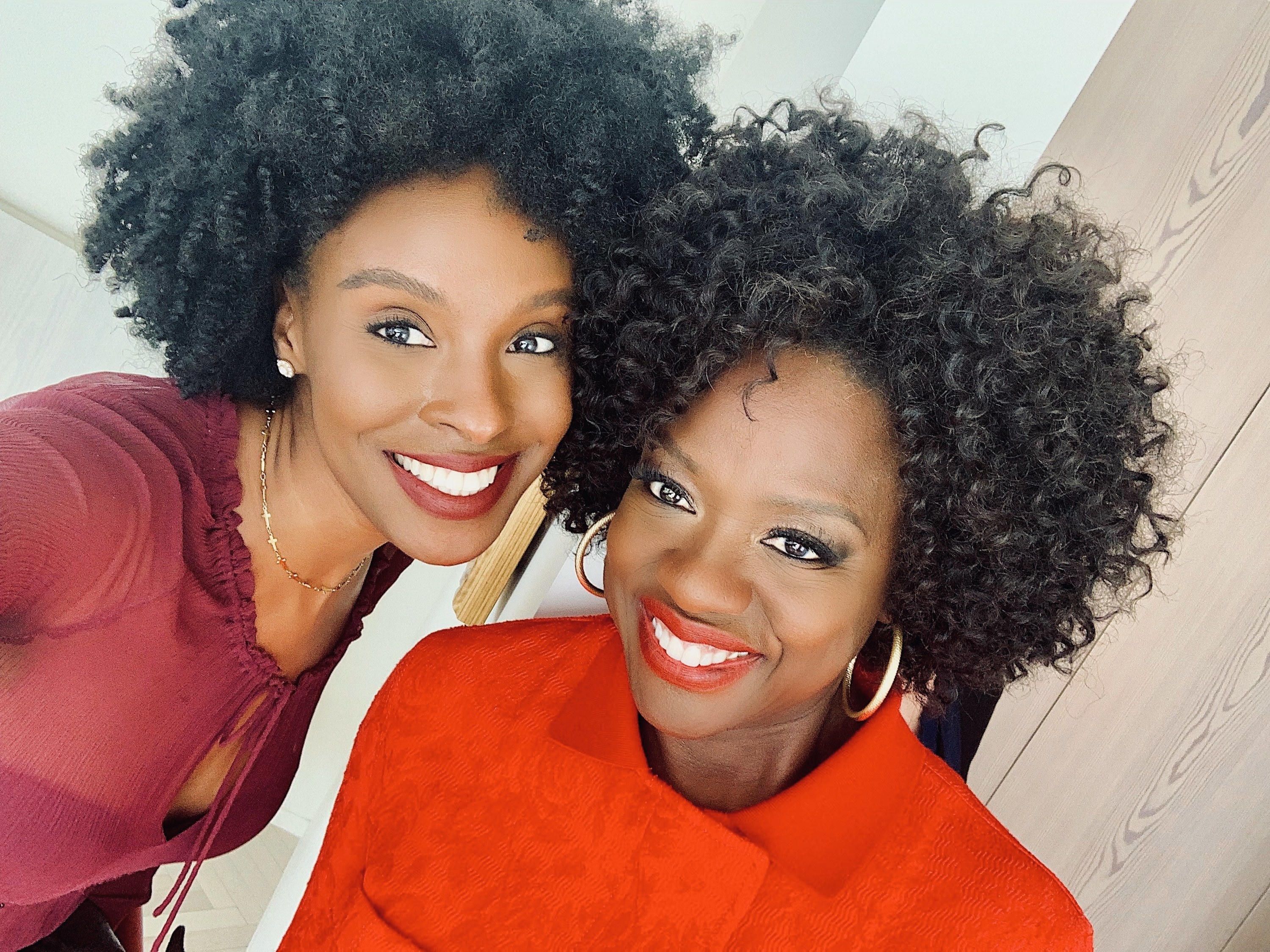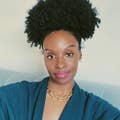From this day forth, when you're listing Viola Davis' receipts — Oscar winner, Emmy winner, NAACP Image winner, and so on — make sure you include face of the number one global beauty brand, L'Oreal!

Yep, the cosmetics giant announced the How To Get Away With Murder star (54) as its newest face just months after fellow icon Celine Dion joined its roster! Considering the beauty industry's long, problematic perpetuation of ageism and racism, and colorism more specifically, this is a huge deal that's so much bigger than Davis' face on a billboard or product box. It's moving the needle forward in a direction underrepresented audiences have been trying to go for years, because the conversation around beauty and representation doesn't just affect our self-esteem or how others rank our desirability. It affects our overall quality of life, proven time and time again as schoolgirls around the world are suspended for wearing their natural hair, as media threatens the safety of black women with its portrayal of us as hypersexual objects, and as society labels us "masculine," "intimidating," and/or "aggressive" anytime we dare to refuse the social and political constructs set to minimize our power. In celebration of her new partnership with L'Oreal, I met with Viola Davis at Times Square Edition to talk about all of this, plus her personal relationship with beauty. We ended our conversation with a selfie and game of "You Can Only Pick One." Her answer to "Red wine or white wine?" is an eternal mood and one of the infinite reasons we stan!
You're officially a beauty icon now! What's that like to get a call from L'Oreal to be a face of the largest beauty brand?
I felt like my life came full circle. I came sort of thrust into the world at a very young age believing everything that culture said about me and everyone who looked like me: That I wasn't as pretty because I was darker skinned and everything was wrong about me. My hair was wrong, my body was wrong, I wasn't a classic beauty. And what makes it worse is then you see it being played out in public. You see it played out in movies. You see it played out in advertisement, until you get hip to the fact that you do have the power to reject that, that you do have the power to say, "Says who? Who says I'm not sexual? Who says I'm not beautiful? Who says?"
To have L'Oreal just sort of step in and say, "You know what? I see you." It felt like I was reconciling that young girl who didn't feel good enough and pretty enough. That's what it felt like. It felt sort of like God interjecting and saying, "You see, I told you it was wrong what people said about you."
I think that a lot of times when people think about beauty they think of just the physical or cosmetics, and that's a part of it. But also there's this political and social context to beauty. It affects people's jobs, their opportunity. Is there a moment in which you remember having that realization like, This is deep?
Oh god, when haven't I? It's the life. It's the realization of how many women have been sexually assaulted, and how at the moment they were sexually assaulted how they sort of just died a living death. And how it infected and affected every other part of their lives of feeling less than, feeling like they had to compartmentalize.
The feeling I get from so many women — I always say women of color especially only because I am a woman of color — but women in general, especially dark skinned women. How many of them in terms of healthcare, in terms of people not listening to us, in terms of people not feeling like we're feminine, in terms of the language people use when they talk about us, in terms of how we're dismissed, how people don't defend us. How statistically in every area we're at the bottom of the barrel. That's when you really understand the true impact of beauty on both ends. People from the outside when they don't consider you to be beautiful, they erase your value. Totally erase it like you're invisible. That's one side, but the other side of it is when we erase ourselves. It's how hard we have to fight for our value. And you fight the good fight and and say, "You know what? I'm going to fight the good fight. I'm going to fight for my mental health. I'm going to fight for my self-love. I'm going to fight for my authenticity." You understand that it's not about going out there and people thinking that I am sexy. I got to show you my great bikini shot and I got to Photoshop out all of my stretch marks and all of that.
That's been my whole journey as a woman. In my late twenties understanding that all my choices are coming from me. Bad relationships, all of that is coming from me. It's not about going to get my hair done every two months. It's about introspection, it's about reconciling, it's about forgiveness. I learned that at 28 years old. Finding healthy relationships, surrounding myself with people who love me, you know? It's been constant, it's a constant narrative, and I think any woman would say that.
Is there anything that you had to unlearn about yourself? Tell me about what you didn't like about yourself that you had to grow into appreciating.
Oh yeah, absolutely. My voice, my nose. Every time I picked up the phone and people would say, "Okay sir, are you sure that that's what you want?" Everything was "sir" because my voice is so deep. Until I realized my grandmother's voice is deep — Her voice I thought was beautiful. She grew up in the deep South, had 18 children. This is one generation removed from slavery; the backwoods of Singleton Plantation. But when she got a phone call it was like the voice of heaven. It didn't even seem like it fit her body. So it's like how could I love it in her and not love it in me, you know? I had to grow into that.
I had to grow into my nose. I can't even believe there was a time that I didn't like my nose because I don't even think about it now. But I always wanted a thinner nose when I was really, really young. So I just grew out of that. There were a lot of things. You know, I grew up in Central Falls, Rhode Island. I grew up in a predominantly white community. I didn't see any reflections of myself in the everyday, except for my parents of course, and my siblings who I love. But I have to say I've really grown into myself. And I'm not saying that every day that I look at pictures of myself and go, Oh! But I feel pretty damn good.
And you look pretty damn good! You slay the red carpets — every single look, every hair style. It's interesting to me that you noticed something like your nose so young. Do you know how old you were?
I was more like 12, 13. I really noticed, but that's only because of bullying. That's because boys, you notice boys and you start getting the tickling feeling in your stomach. And when you hear them whisper things like, "She's ugly, her nose is too big," then you personalize it. It's just human.
What are you teaching your daughter about beauty?
I do it by example. I teach her by example that your heart and your head are the two most important parts of you. And I get it, trust me. I get that you have to see — I'm representing a beauty brand, L'Oreal, and I love beauty products! I love perfume, I love spas. But at the end of the day, at 54 years old, I can tell you on this journey that your value cannot be placed on the external — it just cannot be. There's no U-haul on the back of a hearse. Your legacy has got to be something way deeper than your physical attributes. And I find that what happens with girls too often is people feel that the [physical] beauty is a value, and it's not. It's a little enhancement at best. But that and five cents is not even going to buy you a cup of coffee. Your investment has to be in your character. What do you believe about yourself? How do you handle failure? What are your dreams? How bold are you to live your authentic life? All those things are way more important. That's what I tell my daughter and that's an everyday narrative that I teach her. Because what happens I think with women, when you do feel like the external is the only value, you don't work on anything else. Everything else falls by the wayside and then culture can really eat away at you. The zeitgeist can really eat away at you.
How do you hope to inspire people using the platform and privilege that comes along with being a beauty icon?
I love the mantra of L'Oreal: You're worth it. And I want to say that to women of color especially, and women in general, that you're worth it. You came out of the womb worth it. You were born worth it. You don't even have to get a degree. You don't have to do anything to earn it. You've already earned it by breathing.
But also, I just want to have the strength to tell my story. I feel that as I've gone through life, whenever I've gone through anything, I feel a huge sense of anxiety. Whenever I, in the past I've made a mistake or I feel like I failed or I didn't hit it. And the reason why it felt bad is because you look on that internet and the only stories that people tell are of success and winning. And then you realize that they're not telling the truth, but you don't know that [at first]. You actually do believe that they are telling truth, so you're the one that's wrong. So I think the strength of putting out images that are honest and authentic and giving people permission to literally feel like they don't have to live in shame, even if they have bumps in the road and they fail and they fall or whatever. To understand that's all part of it, that's all a part of your story and you gotta own it. And it's the owning it and reconciling it and understanding that helps you to connect with others. That's what I hope to give to people, that's what I try to give to people. I try to inject every interview I have, every image I have without a filter or as less of a filter as possible.

A round of "Pick One" with Viola Davis:
Kale or Spinach?
Kale
Would you rather have your phone die or have to use a public port-a-potty?
Oh no. I'd rather my phone die.
Body moisturizer or hair moisturizer?
Oh, body moisturizer. Challenging both.
Early mornings or late nights?
I'm going to say early mornings.
Red wine or white wine?
White wine ... Red wine ... Can I choose both?
